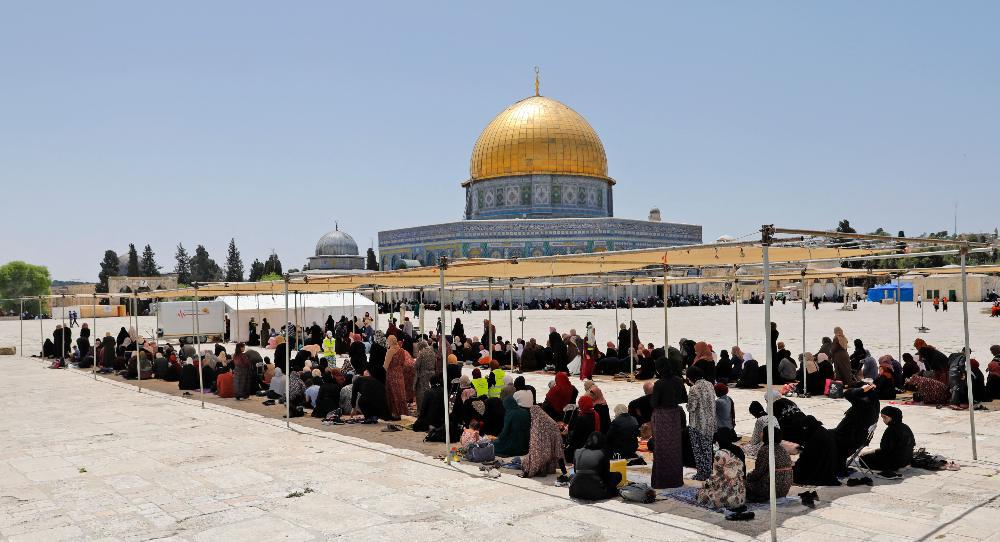In the late 1990s, when I was based in Jerusalem, I wrote a piece about the need for an independent, non-violent Palestinian peace movement.
Benjamin Netanyahu was Israel’s prime minister at the time. Yasser Arafat, chairman of the Palestine Liberation Organization, was still alive, ruling over the Palestinians with an iron fist.
Such a peace movement would surely have been welcomed by Israel. Since the mantra over many years by successive governments was that Israel had no reliable partners on the other side with whom to negotiate a permanent peace settlement, why not support a younger generation of Palestinians desperate for change, desperate for peace and desperate for democracy? The idea held no water for my Israeli interlocutors.
A spokesman for the Israeli government said there was no need for such a movement. So did the Palestinian Authority leadership over in Ramallah, its headquarters in the occupied West Bank. Any such movement would challenge its power. Furthermore, it would upset an insidious status quo forged over the years between successive Israeli governments and the Palestinian leadership.
It was a status quo that disregarded human rights, had no interest in free elections, and did not tolerate independent civil society organizations that would expose the rampant corruption.
That status quo suited Israel’s neighbors. Egypt and Jordan, both of which have peace agreements with Israel, paid lip service to a two-state solution and criticized the conditions under which Palestinians endured the occupation and the illegal expansion of Jewish settlements.
The Europeans, with few exceptions, weren’t much better. In reality, the Palestinians were powerless.
It was hardly surprising that the militant Hamas movement—which Israel encouraged back in the 1980s to weaken and divide Arafat’s Palestinian Liberation Organization—seized the opportunity to challenge the status quo in Ramallah by taking over the Gaza Strip.
Over the past decade, it has been misery for Palestinians living in Gaza. Hamas, backed by Iran, has tolerated no dissent. The people are locked in by Israel and Egypt. Permits to work in Israel are almost impossible to obtain, as are permits for traveling to neighboring Egypt.
Meanwhile, Hamas built up its arsenal of missiles to use as leverage against Israel and against the rival Palestinian leadership in Ramallah.
The building of Jewish settlements on occupied land, forcible evictions of Palestinians in East Jerusalem, and the construction of more walls to keep Palestinians effectively locked in, all with the support of the former U.S. president Donald Trump’s administration, was not sustainable.
The recent decision by Palestinian Authority President Mahmoud Abbas—in power since 2005—to postpone, yet again, elections played into the hands of Hamas.
The latest conflagration between Israel and Hamas should, logically, be the catalyst to end the status quo. That will require an immense diplomatic effort by the United States—and regional players.
In the short term, a ceasefire—which U.S. President Joe Biden has backed—will have to be negotiated. The longer the fighting continues, apart from the terrible increase in civilian casualties of all ages, the greater the risk of more violent clashes between Jews and Arabs inside Israel itself. What small trust existed between both communities is evaporating by the day.
Such is the crux of this conflict: the lack of trust. Palestinians have no trust in their own leadership. They have no trust in Netanyahu and his supporters. They have little trust in peace negotiations.
Over the years, regardless of which government has been in power in Israel, the Palestinians have been demonized and dehumanized. As for Israeli peace movements and those campaigning against the building of settlements, they have little support from an Israeli public that has made security the priority.
Building more walls to keep Palestinians locked in has the inevitable result of radicalizing a younger generation of Palestinians. This vicious circle that predates the Netanyahu government is not sustainable.
The idea of building trust is hard to imagine. The status quo will not be changed if the Biden administration has to contend with Netanyahu and Abbas—whose days should have been numbered long ago—as well as Hamas.
A younger generation, untainted by corruption, could help change the atmosphere. But real trust means conferring on the Palestinians dignity and a viable state, if that is at all possible under the present circumstances.
If both are to be achieved, the Biden administration, with the support of regional players, will have to tackle the Jewish settlements, the status of Jerusalem, and some form of compensation for hundreds of thousands of Palestinians who fled Israel in 1948.
These are the same issues that have characterized this conflict for decades. But now, the complete breakdown of trust is feeding more instability and more violence. The worst is far from over.








